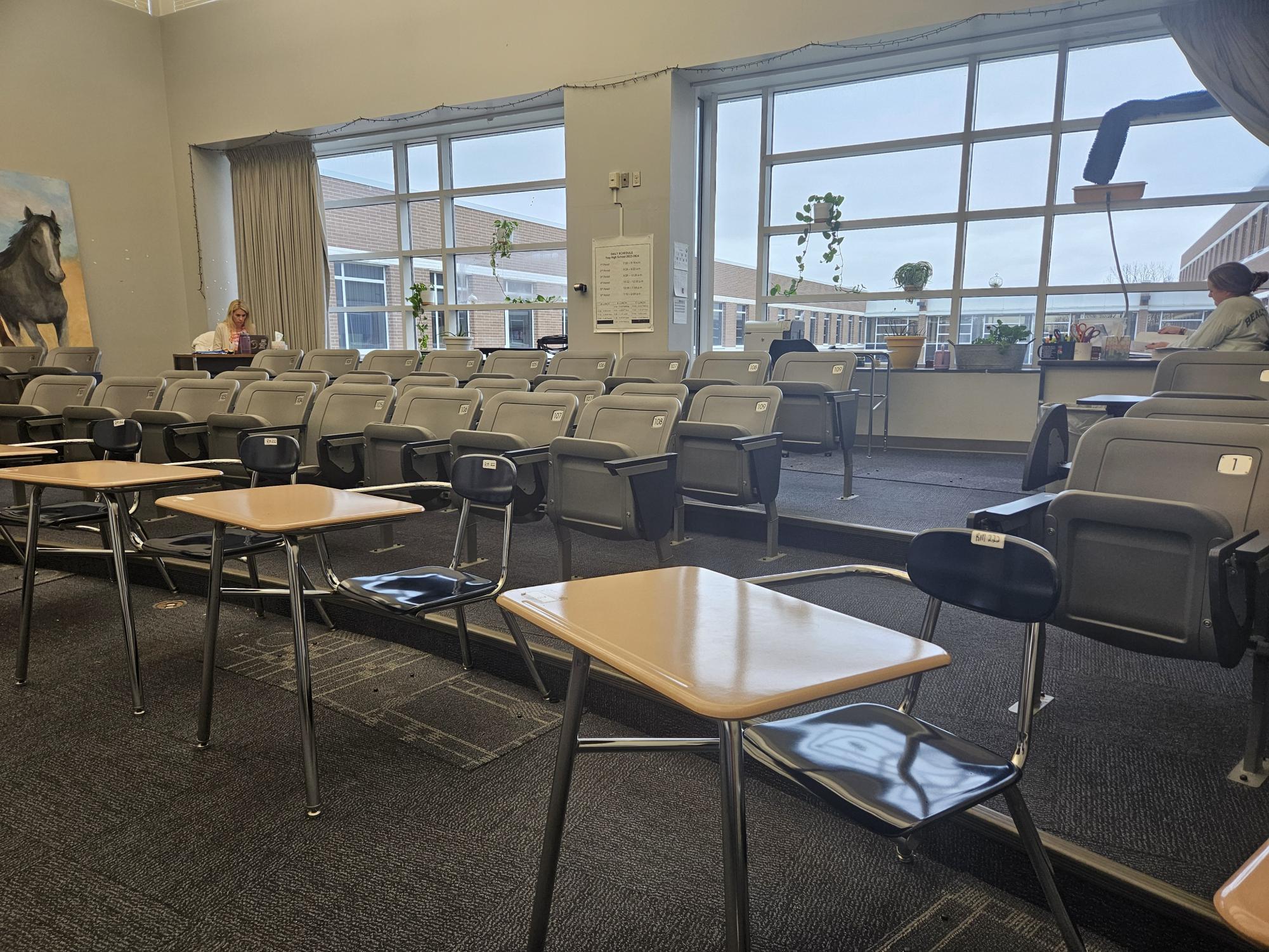The Academic Support Center, colloquially referred to as the ASC by students and staff, is hosted in room 222. Currently, students that have 504 plans or IEPs, individualized education plans, that allow them to test in a place other than their classroom, are placed in the Academic Support Center. The center is intended to be a quiet room where students with accommodations are able to take their tests in a small group setting.
504 plans and IEPs essentially serve the same purpose: to support students with disabilities so that they can learn and participate to the best of their ability in an academic setting. The major difference is that an IEP is a specialized program curated for the student. It may require additional instruction or programs and must be renewed each year, whereas a 504 plan offers accommodations without specialized instructions.
Karly Didocha, the Testing Accommodations and 504 Coordinator, is one of the resource room teachers placed in the Academic Support Center. She clarifies what some of the 504 accommodations might look like for students: “For example, if you were in a wheelchair and needed a special desk. It can be as simple as extra time, things like that. It’s just additional support that can be placed in schools, work or the classroom.”
Senior Annelies Conover currently has an IEP. “I’ve always grown up not being able to spell or do things other people can usually catch on to. An IEP helps me let my teachers know that these are my struggles.” As for what it means in the classroom, she adds, “Teachers don’t really mind about spelling mistakes and that’s usually disregarded in English classes.”
Conover has been utilizing IEP resources since she was in elementary school, but it took her till her sophomore year of high school to be comfortable receiving help. “I hated having one,” she shares. “I felt like I was stupid or like I wasn’t smart enough. Why’d I get these accommodations? Then, sophomore year, I was like, well, they’re helpful. I can use them.”
Once Conover started using the center as part of her IEP, she noticed a significant improvement in her grades. “I love the ASC,” she declares. “It eases the test anxiety that I get. That’s another thing on my IEP: I get very anxious about these things. Having that resource is helpful.”
While Grace Cueny, a senior who also uses the Academic Support Center, shares that she didn’t start using the center until her junior year, the decision was made more out of obligation. “Sophomore year, I didn’t use it at all because I was able to take extra time in a normal classroom, but junior year, they said if you want extra time, you have to take it in the ASC.”
The change came suddenly for Cueny and has remained something she struggles with. “I was forced to do things in the ASC, but it is not a good testing environment.”
She elaborates, explaining that there can often be distractions. “People come in and out a lot. The door closing and shutting is actually really loud. There are people who have their tests read out loud, so that can also be loud.”
There is also the additional problem of overcrowding in the room. As stated previously, the Academic Support Center was expected to be a place where students could test in a small group setting, and a “small group” in a testing environment is defined to be ten or fewer students.
When speaking about the overcrowding that she had experienced in the Academic Support Center, senior Katherine Gallihugh said that it’s usually “crowded if you have more than ten students in there. Now I think you are getting 15 to 20 in there on a busy day, especially before breaks. It’s too crowded. For my accommodations specifically, I have an alternate location for testing, so that it’s a quiet room, and then you don’t get that quiet room that is promised.”
However, Didocha clarifies that the center’s capacity is rarely linear, with some hours of the school day having no more than two students in the room at a time. “We do have many more students that have access to the room now than we used to,” she concedes.
Currently, Troy High School has 130 special education students and 185 students with 504 plans. Six years ago, the amount of special education students was relatively the same, however, there were only 60 students with 504 plans. Didocha adds, “Not everyone chooses to use the space, but everybody has access to it.”
The Academic Support Center was recently moved into the lecture hall from the Stable, which has also contributed to the problems that students are experiencing. The lecture hall does not have the same size desks as typical classrooms; it evidently has lecture hall seating, which means that many of its seats have very limited desk space. There are a few regular desks in the classroom, but with the overcrowding, those desks are not always available.
When asked about her experience in the Academic Support Center, Gallihugh states that the desks aren’t big enough and that “a piece of paper with your calculator or iPad won’t fit on there.”
Conover agrees, stating, “That room isn’t suitable for what they want to do with it.” She continues, “Honestly, I don’t think it should hold more than five people. There’s not that many desks and they want to space people out. They have that stadium seating and those are just stupid. Those are not useful.”
Some students blame the noise on others who don’t require the room or rumors that people have been falsifying 504 plans, however, Didocha refutes these claims. “Everybody that has a 504 or an IEP, you know, we have a team of people that have decided that, including maybe their doctors and their parents or a therapist or whatever, that this is something that will be beneficial to them.” She continues, “But somewhere along the line, it’s been determined that it might not appear on the outside that they do, but they do [need it].”
The process for obtaining an IEP or 504 plan is lengthy. It begins with notifying the student’s counselor about any concerns or difficulties in class. This notification may also take place at the behest of a doctor. After a conversation with the counselor, the Multi-tiered System of Supports team then discusses the prospect of accommodations with teachers before engaging in a 30-day review process, where testing is done to confirm what needs the student may have and how to satisfy them. Then, the student is given a 504 plan, with which they may choose to use the Academic Support Center and its resources.
For an IEP, the special education team is consulted. “The social worker and psychologist do testing,” Didocha shares. “Cognitive testing, academic testing, to see where your skills lie and what’s impacted. You might have ADHD, but you might have all kinds of great coping strategies and maybe it’s not impacting you at all.”
In order to qualify for a 504 plan or IEP, the student’s disability or condition must be inhibiting their schoolwork significantly for it to be granted. If it’s decided that the student doesn’t require accommodations, the process is abandoned.
When it comes to using the Academic Support Center, the administrators don’t always double-check that everyone using the room has a 504 plan or an IEP. “We prefer that it is, but things happen, right?” Didocha says.
Didocha goes on to list reasons why students without a 504 plan or IEP may be testing inside the center. “Maybe you don’t want to sit out in the hallway outside your teacher’s class, and your teacher really doesn’t want that. So sometimes we have students that were absent come down and do it. That’s not a regular thing.” She continues, “We have students who are evaluating for that IEP. And we’re like, hey, let’s try some things and see if they work. And they’re helpful. And they may come in, on and off while we’re doing that evaluation piece until we decide. But nobody just decides, okay, they’re in biology, and they’re like, hey, I want to go down there and come down.”
Still, she reiterates, nobody is using the Academic Support Center that isn’t allowed to or doesn’t need the help it provides.
Regardless, the issue of space remains a prevalent issue among those using the room. “I love going down there, and I feel like they need an upgrade really, really bad,” Conover admits.
“I do think that Troy High School is one of the better places for accommodations,” Gallihugh says, agreeing with Conover’s sentiment. “I am grateful to have it, and I always know there’s help where sometimes there is not for kids in other districts. I do want to say it is a great program, but it may need a little more help.”





